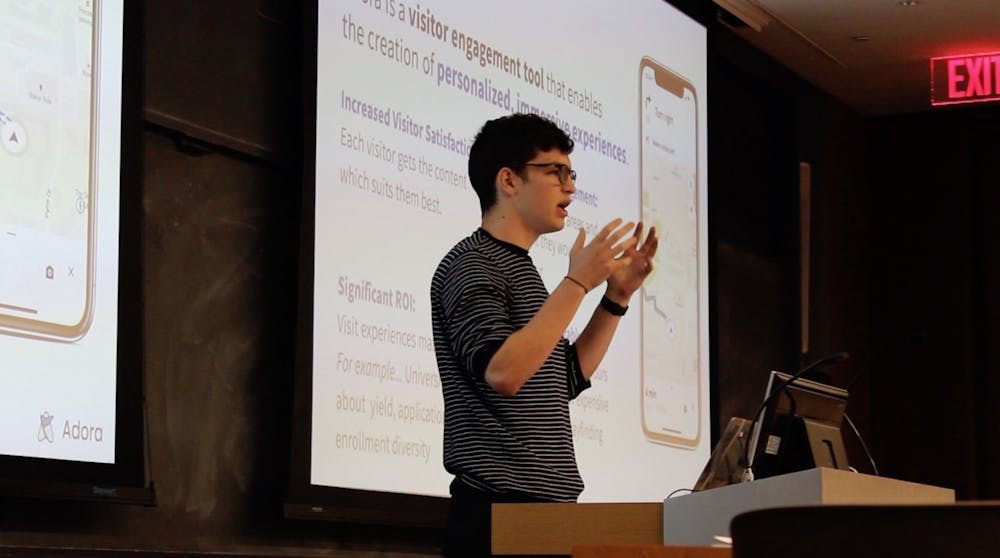On Feb. 23, seven student-run startups presented pitches before a panel of established venture capitalists in a competition for $6,000. The winning project, Adora Experiences, will provide self-guided tours to students as early as this May.
The augmented reality application will allow visiting students to take a self-guided tour of the campus. Entrepreneurship Club (E-Club) co-director Austin Mejia ’21 likened the format to Pokemón Go.
The technology will allow visiting students to gain a more individualized glimpse of the University campus, beyond what is presented in Orange Key tours and informational sessions. It will also allow the University to reduce its dependence on existing paper-based self-guided tours.
The project began last year as a collaboration between CEO Ron Miasnik ’22, Chief Architect Joseph Rubin ’22, Head of User Experience Raya Ward ’21, and Chief Engineer Sacheth Sathyanarayanan ’22. The team intends to expand the project to other university campuses as well.
Rubin is a business staffer on The Daily Princetonian.
Unlike previous events such as TigerLaunch, which offered winners the chance to compete in a larger pitch competition, E-Club’s pitch competition offered a tangible cash prize. Half of the reward will come in the form of a legal contract, while the other half is a cash prize from E- Club’s funding.
When planning the event, the club’s leaders had hoped for around 10 applications, but ultimately received over 20, allowing them to raise the number of finalists from six to seven. No two finalists were from the same industry, reflecting the range of issues that student entrepreneurs are interested in tackling. Pitches ranged from SaplingSPC, a company trying to create a carbon footprint label for everyday goods, to Allergzy, a company developing technology to test for allergies through DNA sequencing.
When choosing which teams would present pitches, the club’s standards were high.

“If this idea isn’t a 10 times improvement on something that is already being done, it isn’t appropriate for the competition,” said Mejia.
A number of the judges of the competition were University alumni and each had at least a decade of investment experience after graduation. Although the winning app did directly service the needs of the University, Mejia believed that this had not played a role in Adora’s victory. Rather, the company’s innovative idea allowed them to see past their “orange-tinted glasses.”
The University has expressed excitement about working with Adora Experiences through this project.
“The self-guided tour app is unlike anything we’ve seen in the virtual space. This project is a prime example of the creativity, talent, and entrepreneurial drive of our student body,” Deputy University Spokesperson Michael Hotchkiss wrote in an email to the ‘Prince’.

The success of the E-Club competition was commended by both organizers and participants. In an exit survey conducted by the club, all participants agreed that the event was necessary to support student entrepreneurship within the University community. Furthermore, all applicants, even those not selected as finalists, stated that they would participate in the competition in future years.
Following the success of this year’s competition, the E-Club plans to make the event an annual tradition.
“Princeton is not traditionally known as an entrepreneurship community, especially among the Ivy League, but the turnout and support for this event speaks to the fact that that narrative is changing and that Princeton is becoming a more entrepreneurial campus,” Mejia explained.








